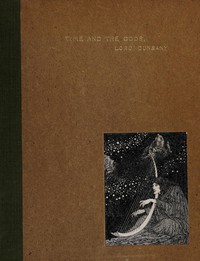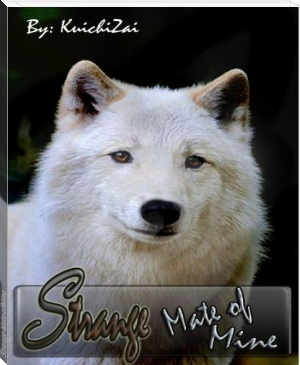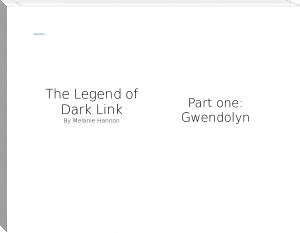Time and the Gods by Lord Dunsany (top ebook reader TXT) 📗

- Author: Lord Dunsany
Book online «Time and the Gods by Lord Dunsany (top ebook reader TXT) 📗». Author Lord Dunsany
“A year had passed over the silence of Kithneb when he came to me and spake. And I bowed before him because we believed that he spake among the gods. And Kithneb said:
“‘I will speak to thee before the end because I am most lonely. For how may I speak again with men and women in the little streets of Rhistaun among the houses, when I have heard the voices of the gods singing above the twilight? But I am more lonely than ever Rhistaun wonts of, for this I tell thee, when I hear the gods I know not what They say. Well indeed I know the voice of each, for ever calling me away from contentment; well I know Their voices as they call to my soul and trouble it; I know by Their tone when They rejoice, and I know when They are sad, for even the gods feel sadness. I know when over fallen cities of the past, and the curved white bones of heroes They sing the dirges of the gods’ lament. But alas! Their words I know not, and the wonderful strains of the melody of Their speech beat on my soul and pass away unknown.
“‘Therefore I travelled from the land of Hurn till I came to the house of the prophet Arnin-Yo, and told him that I sought to find the meaning of the gods; and Arnin-Yo told me to ask the shepherds concerning all the gods, for what the shepherds knew it was meet for a man to know, and, beyond that, knowledge turned into trouble.
“‘But I told Arnin-Yo that I had heard myself the voices of the gods and knew that They were there beyond the twilight and so could never more bow down to the gods that the shepherds made from the red clay which they scooped with their hands out of the hillside.
“‘Then said Arnin-Yo to me:
“‘“Natheless forget that thou hast heard the gods and bow down again to the gods of the red clay that the shepherds make, and find thereby the ease that the shepherds find, and at last die, remembering devoutly the gods of the red clay that the shepherds scooped with their hands out of the hill. For the gifts of the gods that sit beyond the twilight and smile at the gods of clay, are neither ease nor contentment.”
“‘And I said:
“‘“The god that my mother made out of the red clay that she had got from the hill, fashioning it with many arms and eyes as she sang me songs of its power, and told me stories of its mystic birth, this god is lost and broken; and ever in my ears is ringing the melody of the gods.”
“‘And Arnin-Yo said:
“‘“If thou wouldst still seek knowledge know that only those that come behind the gods may clearly know their meaning. And this thou canst only do by taking ship and putting out to sea from the land of Hurn and sailing up the coast towards the forest. There the sea cliffs turn to the left or southward, and full upon them beats the twilight from over the sea, and there thou mayest come round behind the forest. Here where the world’s edge mingles with the twilight the gods come in the evening, and if thou canst come behind Them thou shalt hear Their voices clear, beating full seaward and filling all the twilight with sound of song, and thou shalt know the meaning of the gods. But where the cliffs turn southward there sits behind the gods Brimdono, the oldest whirlpool in the sea, roaring to guard his masters. Him the gods have chained for ever to the floor of the twilit sea to guard the door of the forest that lieth above the cliffs. Here, then, if thou canst hear the voices of the gods as thou hast said, thou wilt know their meaning clear, but this will profit thee little when Brimdono drags thee down and all thy ship.’”
“Thus spake Kithneb to me.
“But I said:
“‘O Kithneb, forget those whirlpool-guarded gods beyond the forest, and if thy small god be lost thou shalt worship with me the small god that my mother made. Thousands of years ago he conquered cities but is not any longer an angry god. Pray to him, Kithneb, and he shall bring thee comfort and increase to thy flocks and a mild spring, and at the last a quiet ending for thy days.’
“But Kithneb heeded not, and only bade me find a fisher ship and men to row it. So on the next day we put forth from the land of Hurn in a boat that the fisher folk use. And with us came four of the fisher folk who rowed the boat while I held the rudder, but Kithneb sat and spake not in the prow. And we rowed westward up the coast till we came at evening where the cliffs turned southward and the twilight gleamed upon them and the sea.
“There we turned southwards and saw at once Brimdono. And as a man tears the purple cloak of a king slain in battle to divide it with other warriors,—Brimdono tore the sea. And ever around and around him with a gnarled hand Brimdono whirled the sail of some adventurous ship, the trophy of some calamity wrought in his greed for shipwreck long ago where he sat to guard his masters from all who fare on the sea. And ever one far-reaching empty hand swung up and down so that we durst go no nearer.
“Only Kithneb neither saw Brimdono nor heard his roar, and when we would go no further bade us lower a small boat with oars out of the ship. Into this boat Kithneb descended, not heeding words from us, and onward rowed alone. A cry of triumph over ships and men Brimdono uttered before him, but Kithneb’s eyes were turned toward the forest as he came behind the gods. Upon his face the twilight beat full from the haunts of evening to illumine the smiles that grew about his eyes as he came behind the gods. Him that had found the gods above Their twilit cliffs, him that had heard Their voices close at last and knew Their meaning clear, him, from the cheerless world with its doubtings and prophets that lie, from all hidden meanings, where truth rang clear at last, Brimdono took.”
But when Paharn ceased to speak, in the King’s ears the roar of Brimdono exulting over ancient triumphs and the whelming of ships seemed still to ring.
XThen Mohontis spake, the hermit prophet, who lived in the deep untravelled woods that seclude Lake Ilana.
“I dreamed that to the west of all the seas I saw by vision the mouth of Munra-O, guarded by golden gates, and through the bars of the gates that guard the mysterious river of Munra-O I saw the flashes of golden barques, wherein the gods went up and down, and to and fro through the evening dusk. And I saw that Munra-O was a river of dreams such as came through remembered gardens in the night, to charm our infancy as we slept beneath the sloping gables of the houses of long ago. And Munra-O rolled down her dreams from the unknown inner land and slid them under the golden gates and out into the waste, unheeding sea, till they beat far off upon low-lying shores and murmured songs of long ago to the islands of the south, or shouted tumultuous paeans to the Northern crags; or cried forlornly against rocks where no one came, dreams that might not be dreamed.
“Many gods there be, that through the dusk of an evening in the summer go up and down this river. There I saw, in a high barque all of gold, gods the of the pomp of cities; there I saw gods of splendour, in boats bejewelled to the keels; gods of magnificence and gods of power. I saw the dark ships and the glint of steel of the gods whose trade was war, and I heard the melody of the bells of silver arow in the rigging of harpstrings as the gods of melody went sailing through the dusk on the river of Munra—O. Wonderful river of Munra—O! I saw a grey ship with sails of the spider’s web all lit with dewdrop lanterns, and on its prow was a scarlet cock with its wings spread far and wide when the gods of the dawn sailed also on Munra-O.
“Down this river it is the wont of the gods to carry the souls of men eastward to where the world in the distance faces on Munra-O. Then I knew that when the gods of the Pride of Power and gods of the Pomp of Cities went down the river in their tall gold ships to take earthward other souls, swiftly adown the river and between the ships had gone in this boat of birch bark the god Tarn, the hunter, bearing my soul to the world. And I know now that he came down the stream in the dusk keeping well to the middle, and that he moved silently and swiftly among the ships, wielding a twin-bladed oar. I remember, now, the yellow gleaming of the great boats of the gods of the Pomp of Cities, and the huge prow above me of the gods of the Pride of Power, when Tarn, dipping his right blade into the river, lifted his left blade high, and the drops gleamed and fell. Thus Tarn the hunter took me to the world that faces across the sea of the west on the gate of Munra-O. And so it was that there grew upon me the glamour of the hunt, though I had forgotten Tarn, and took me into mossy places and into dark woods, and I became the cousin of the wolf and looked into the lynx’s eyes and knew the bear; and the birds called to me with half-remembered notes, and there grew in me a deep love of great rivers and of all western seas, and a distrust of cities, and all the while I had forgotten Tarn.
“I know not what high galleon shall come for thee, O King, nor what rowers, clad with purple, shall row at the bidding of gods when thou goest back with pomp to the river of Munra-O. But for me Tarn waits where the Seas of the West break over the edge of the world, and, as the years pass over me and the love of the chase sinks low, and as the glamour of the dark woods and mossy places dies down in my soul, ever louder and louder lap the ripples against the canoe of birch bark where, holding his twin-bladed oar, Tarn waits.
“But when my soul hath no more knowledge of the woods nor kindred any longer with the creatures of the dark, and when all that Tarn hath given it shall be lost, then Tarn shall take me back over the western seas, where all the remembered years lie floating idly aswing with the ebb and flow, to bring me again to the river of Munra-O. Far up that river we shall haply chase those creatures whose eyes are peering in the night as they prowl around the world, for Tarn was ever a hunter.”
XIThen Ulf spake, the prophet who in Sistrameides lives in a temple anciently dedicated to the gods. Rumour hath guessed that there the gods walked once some time towards evening. But Time whose hand is against the temples of the gods hath dealt harshly with it and overturned its pillars and set upon its ruins his sign and seal: now Ulf dwells there alone. And Ulf said, “There sets, O King, a river outward from earth which meets with a mighty sea whose waters roll through space and fling their billows on the shores of every star. These are the river and the sea of the Tears of Men.”
And the King said:
“Men have not written of this sea.”
And the prophet answered:
“Have not tears enough burst in the night time out of sleeping cities? Have not the sorrows of 10,000 homes sent streams into this river when twilight fell and it was still and there was none to hear? Have there not been hopes, and were they all fulfilled? Have there not been conquests and bitter defeats? And have not flowers when spring was over died in the gardens of many children? Tears enough, O King, tears enough have gone down out of earth to make such a sea; and deep it is and wide and the gods know it and it flings its spray on the shores of





Comments (0)